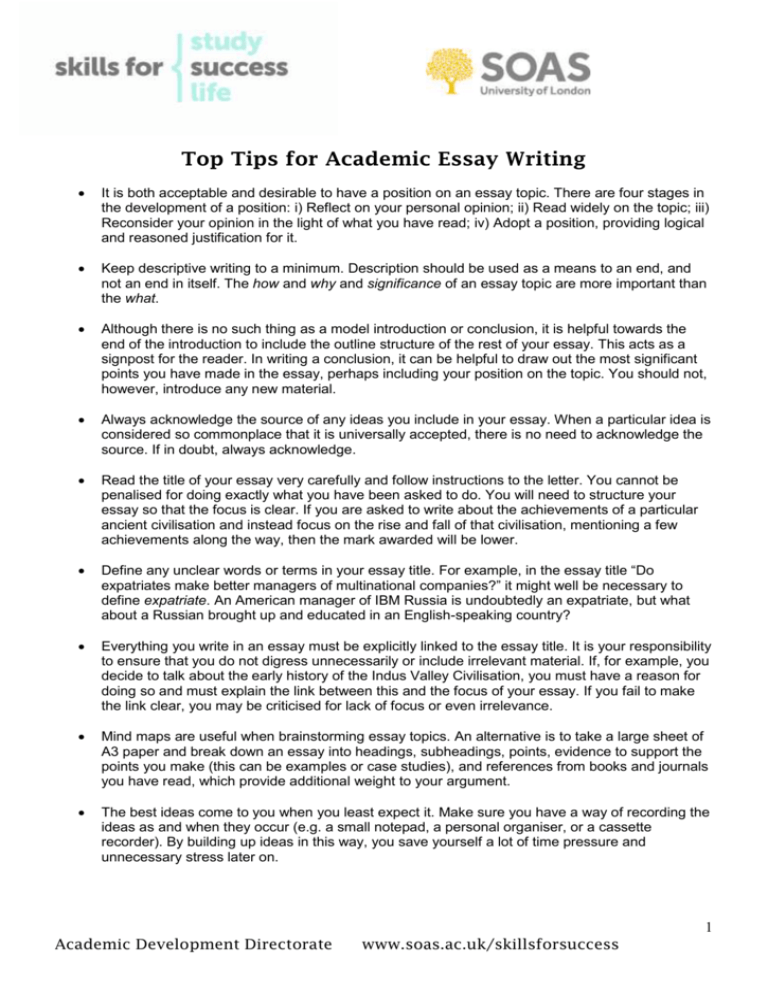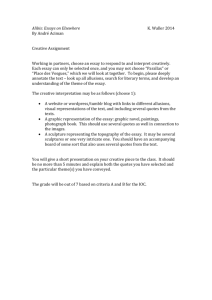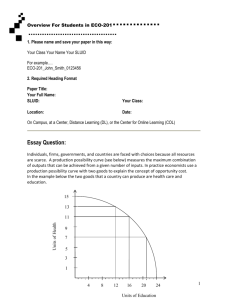SOAS A4 Word Template - SOAS University of London
advertisement

Top Tips for Academic Essay Writing It is both acceptable and desirable to have a position on an essay topic. There are four stages in the development of a position: i) Reflect on your personal opinion; ii) Read widely on the topic; iii) Reconsider your opinion in the light of what you have read; iv) Adopt a position, providing logical and reasoned justification for it. Keep descriptive writing to a minimum. Description should be used as a means to an end, and not an end in itself. The how and why and significance of an essay topic are more important than the what. Although there is no such thing as a model introduction or conclusion, it is helpful towards the end of the introduction to include the outline structure of the rest of your essay. This acts as a signpost for the reader. In writing a conclusion, it can be helpful to draw out the most significant points you have made in the essay, perhaps including your position on the topic. You should not, however, introduce any new material. Always acknowledge the source of any ideas you include in your essay. When a particular idea is considered so commonplace that it is universally accepted, there is no need to acknowledge the source. If in doubt, always acknowledge. Read the title of your essay very carefully and follow instructions to the letter. You cannot be penalised for doing exactly what you have been asked to do. You will need to structure your essay so that the focus is clear. If you are asked to write about the achievements of a particular ancient civilisation and instead focus on the rise and fall of that civilisation, mentioning a few achievements along the way, then the mark awarded will be lower. Define any unclear words or terms in your essay title. For example, in the essay title “Do expatriates make better managers of multinational companies?” it might well be necessary to define expatriate. An American manager of IBM Russia is undoubtedly an expatriate, but what about a Russian brought up and educated in an English-speaking country? Everything you write in an essay must be explicitly linked to the essay title. It is your responsibility to ensure that you do not digress unnecessarily or include irrelevant material. If, for example, you decide to talk about the early history of the Indus Valley Civilisation, you must have a reason for doing so and must explain the link between this and the focus of your essay. If you fail to make the link clear, you may be criticised for lack of focus or even irrelevance. Mind maps are useful when brainstorming essay topics. An alternative is to take a large sheet of A3 paper and break down an essay into headings, subheadings, points, evidence to support the points you make (this can be examples or case studies), and references from books and journals you have read, which provide additional weight to your argument. The best ideas come to you when you least expect it. Make sure you have a way of recording the ideas as and when they occur (e.g. a small notepad, a personal organiser, or a cassette recorder). By building up ideas in this way, you save yourself a lot of time pressure and unnecessary stress later on. 1 Academic Development Directorate www.soas.ac.uk/skillsforsuccess Use index cards when you start to record bibliographical details or, alternatively, make sure you start to produce an electronic bibliography early on. It saves a last-minute rush before the essay deadline. As you read books and journals, always be on the look-out for anything relevant to your essay topic and note this down (with a page reference) on an index card, along with the bibliographical details. Two or three points noted down from a wide range of sources is preferable to overreliance on a single source. A characteristic of academic writing in English is that in any particular sentence there should be a clear forward and backward link. So, if you write, “Let us now consider the third point…”, it is clear the backward link is with the second point (which you have just finished dealing with) and the forward link is the new point you are about to make. Avoid kangaroo essays, that jump from point to point in no logical or rational way. Indirect quotes have two advantages over direct quotes: they show you have understood what you have read and that you are able to incorporate it meaningfully into your essay. In some situations, direct quotes are preferable; for example, where the actual words used are difficult or impossible to paraphrase. In all cases, quotes should be used to provide support for your argument. You should never quote just for the sake of it. Consistency is essential when putting a bibliography together. Choose one style (possibly from a book you have read or the style your tutor uses in his/her published works) and stick to that. 2 Academic Development Directorate www.soas.ac.uk/skillsforsuccess







